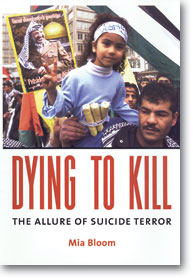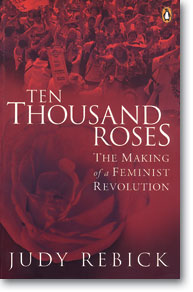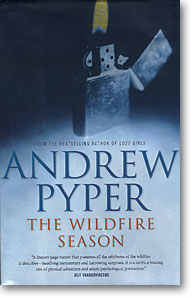Reviews
Dying to Kill: The Allure of Suicide Terror, Columbia University Press, 2005, $31, by Mia Bloom, BA'89

We think of suicide terror attacks as a modern phenomenon, but as political scientist Mia Bloom points out in Dying to Kill, Al Qaeda and Hamas are hardly pioneers. In the Middle East between 1090 and 1256 AD, members of an Islamic sect known as the Assassins performed spectacular murders, stabbing their enemies in highly public settings. The murders were widely witnessed, inspiring the fear (among those targeted) and reverence (among sympathizers) that are common reactions to contemporary suicide bomb attacks.
"With one carefully planned attack, a small force prepared to die in the course of killing others could cripple their more powerful enemy. They realized, too, that the fear or memory of such an attack could be as paralyzing as the attack itself."
Bloom, who is a consultant to the New Jersey Office of Counter Terrorism, examines the motives and machinations behind suicide terror attacks. One of the most interesting sections of her book focuses on the recent rise in the number of women taking part in suicide bombings in Chechnya, Sri Lanka and Israel.
They often have very personal motivations - many have lost family members to violence or suffered rape at the hands of their enemies. While some see these suicide attacks as a peculiar form of gender equity that will pay future dividends for women's rights in these societies, Bloom is dubious. "Fanaticism and death cults generally do not lead to liberation politics for women."
Bloom notes that suicide terror campaigns tend to evaporate once the populations the terrorists profess to represent begin to believe that their aspirations can be realized through non-violent means. In Turkey, the government initially used barbaric methods in its struggle against the Kurdish terrorist group, the PKK. After Turkey moderated its approach and offered the Kurds some religious and cultural freedoms, the PKK leader renounced terror and the group eventually disbanded.
Bloom believes there is a lesson here for leaders in Jerusalem and Moscow. While Israeli forces succeed in thwarting many terror attacks, Bloom believes
their methods create more potential suicide bombers as Palestinians become increasingly embittered by mass arrests, curfews, travel restrictions, occupations and the use of deadly force in retaliation. A Palestinian population that has some hope for the future is very much in Israel's self-interest, Bloom argues. Ditto for Russia and Chechnya.
In the battle against suicide bombers, Bloom believes it's just as important to offer people on the other side the prospect of a good education, a decent
job and some political freedoms as it is to stamp out the terrorists. In the long run, she argues, it is probably the only effective option.
DANIEL MCCABE, BA'89
Ten Thousand Roses: The Making of a Feminist Revolution, Viking Canada 2005, $24, by Judy Rebick, BSc'67

So, just how far have we come, baby? Feminist and political commentator Judy Rebick says, "Remembering how far we have come in a single generation is also a way of making sure we never go back." A former president of Canada's National Action Committee on the Status of Women, Rebick now publishes a web magazine and holds the Sam Gindin Chair in Social Justice and Democracy at Ryerson University in Toronto.
The book's title refers to the bread and roses theme of the 1995 anti-poverty march from Montreal to Quebec City. A rose grower on the route was so inspired that he brought 10,000 roses to greet the marchers at the end of their trek. The roses also symbolize the thousands of women who made a feminist revolution possible. Rebick wanted to record some of their stories before the memories were lost.
Covering the 1960s to the present, the book mostly deals with the '70s and '80s and Canada's "second wave" of feminism. "Radical uppity women are everywhere in this book, and I hope readers will enjoy and learn from them." From high ideals to small squabbles, this oral history, told by more than 100 feminists from across the country, provides recollections of the events that Rebick summarizes in her introductions to each decade. Diverse personalities shine through in the individual reminiscences and group exchanges.
We're reminded of firsts, many quite recent: in 1980 a woman became leader of a provincial political party, and in 1981 a woman was appointed to the Supreme Court. We're also reminded of how many social issues came under the banner of the women's movement - employment equity, access to abortion, daycare, rights for Aboriginal women, access for the disabled, among others - and of the passion and commitment that brought changes in attitudes and legislation.
Although Rebick comes to the conclusion that "so much remains to be done to achieve the vision we had for an egalitarian world," Monique Simard, a long-time activist in the labour movement, notes that her daughter's generation can take for granted achievements such as access to maternity leave and higher education.
Lively and readable, Ten Thousand Roses will serve as a recollection for some and an eye-opener for others, particularly younger readers. It shows that ordinary individuals can influence history, and the results are no less dramatic for having started over a kitchen table.
ELIZABETH HOLLINGSWORTH
The Wildfire Season, HarperCollins, 2005, $29.95, Andrew Pyper, BA'91, MA'92

For three-quarters of the way, Andrew Pyper's latest novel, The Wildfire Season, is a great read. Then, as the book races towards its climax, the wheels inexplicably fall off, a pity because the novel has much to recommend it.
Pyper's previous books, including Lost Girls and The Trade Mission, have earned rave reviews and there is no question that the author has a talent for crafting suspenseful page-turners with meat on their bones. He puts considerable effort into rooting his tales in their distinct settings - throughout The Wildfire Season, the backwoods northern town of Ross River springs vibrantly to life.
He also has a gift for finely sketching his characters and their darker motivations. Ross River's fire chief, Miles McEwan, is hard-drinking and hot-tempered, and we soon find out he has abandoned his girlfriend and their child in the wake of a deadly blaze that damaged him in more ways than one. Nonetheless, we can't help but empathize as we learn more about him. An even grimmer denizen of Ross River nurses a dangerous loathing of McEwan and it's to Pyper's credit that this brutal character's point of view seems entirely believable. McEwan's ex-girlfriend turns up to complicate matters further, toting their daughter and planning a very particular form of revenge.
Pyper even manages to pull off the tricky gambit of having part of his tale told in the voice of a bear pursued by a hunting party. The grizzly, in fact, turns out to be one of the book's most sympathetic characters, even as it plays a key role in the novel's most devastatingly violent sequence.
So what goes wrong at the end? Miles is clearly a tough hombre, but it strains credulity as he, at the point of exhaustion, races back and forth on foot, rescuing loved ones from a raging fire and confronting a deranged gunman to boot. Pyper also sets up an intriguing mystery as to who started the fire, only to offer the solution in a rushed and clumsy manner.
The good bits in Pyper's book are quite good indeed; it just runs out of steam a little too early.
DANIEL MCCABE


